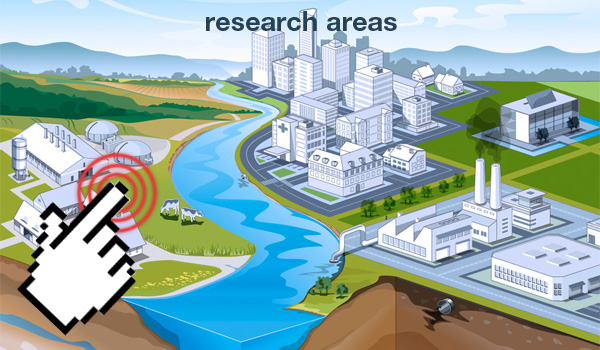
IE 9 or higher
Main research areas
Research in the Department of Environmental Engineering
Research means for the Department of Environmental Engineering (TUCHEM) the gain of knowledge as well as finding novel solutions for current problems. In many cases, these two issues can be combined but often they represent areas of conflicts. The gaining of knowledge is tied to basic research that results in scientific publications. The criteria of scientific success are given by the number and quality of publications. However, publications are only written paper. They do not necessarily cause effects in the real world. We would like to go one step further: to approach solving problems via the gain of knowledge. Our research can be ‘idea-driven’ or ‘problem driven’ - both approaches are equitable. Products of applied research are novel technologies legally protected by patents and utility models.
The department is currently embedding three research groups consisting of 25 co-workers of which half are permanent employees of the UFZ. The interdisciplinary composition of the groups is ideal to tackle the development of basics of novel techniques. The groups consist of chemists, physicists, and environmental engineers. Highly experienced technicians who take care of experimental methods and instruments play an important role in the structure. Furthermore, there are several PhD-candidates, and master and bachelor students who help developing and verifying new ideas.
The central point of our research is focused on developing methods and technologies to eliminate pollutants from the environment, i.e. soil, water bodies, and the atmosphere.
Based on exploring the fate of chemicals in the environment, we apply concepts such as 'enhanced natural attenuation' (via reactive colloidal particles) and highly advanced technologies with high technical demands and energy input, for example the cold plama technology .
Our department is - next to water treatment technologies and environmental catalysis – a world leader in the development and application of radio wave technologies for environmental chemical engineering.
Recently, a new topic has gained our interest: developing technologies for production and refinement of energy carriers made from renewable resources . Hereby, the keywords are hydrothermal carbonization (HTC) and biogas.
Our research is primarily experimental ranging from laboratory scale over pilot-plant scale to field trials.
The key competence of the department lies in the field of abiotic physical and chemical processes. But when we lack expertise, we are also collaborating with other Departments of the UFZ, such as Analytics, Microbiology, and Toxicology.
Next to applied research we demonstrate scientific excellence by publishing in leading scientific journals in the area of environmental technology, such as Environmental Science & Technology and Applied Catalysis B: Environmental.
We are proud to be a key scientific contact for industry and economy for giving advice and solving problems with regard to pollutant remediation and environmental engineering. Therefor, we have to show widespread visibility and broad expertise in various kinds of media next to scientific journals. We see ourselves as scientific service provider to customers for solving environmental challenges, but we primarily regard ourselves as researches less as developers. The results of our technology and application driven research are also shown in extensive patent activities.
Our department has had many contacts and collaborations with industry, e.g. with Bayer AG, BASF AG, Dürr AG, Bauer Umwelt GmbH, eneotech Umwelttechnik GmbH (former BilfingerBerger Umwelttechnik), Ecologia Environmental Solutions Ltd. (UK), Frisesdahl (DK), Orbicon (DK), Dreyer & Bosse Kraftwerke GmbH, E.G.O. Elektro-Gerätebau GmbH, whose maintenance and support are very valuable to us.
The following pages show our current research areas in more detail.
